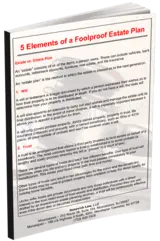
Congratulations! You’ve just bought a new house. Or a second house. Or a new car. Or opened another retirement brokerage account / bought more life insurance. Do these assets require a new Will, or an update to an existing Will? Well, it depends…
Well written Wills generally dictate what happens with your “residuary estate”, after you’ve given away other tangible assets or specific gifts. For instance, if your Will says to give your brother $1,000 and your sister a watch, and doesn’t name any other specific gifts or items, EVERYTHING else that you have of value becomes part of your residuary estate. So, that house, 2nd house, car, etc all become part of your residuary estate to be divided up as your will describes.
But wait, what about a real estate, specifically? If you’re the sole owner of the real estate, then the above holds true – and it becomes part of the residuary estate. You may own a house with a friend or partner, in which case the deed may say that you own it as “tenants-in-common”. If thats the case, your share becomes part of your residuary estate, which may cause problems for your friend / partner, who is now forced to deal with a new partner in owning the asset.
If you own real estate with your spouse, the deed likely says “joint-tenants-by-the-entirety”, meaning that when one of you passes away, the other automatically becomes the sole owner of the real estate…when the second spouse passes, it becomes part of that spouse’s residuary estate, which may cause issues if its a 2nd marriage and you wanted your kids to inherit your share of the real estate. These situations MAY require an update to your estate plan, depending on what your intentions are when you pass away.
Finally, I specifically mentioned a retirement brokerage account and more life insurance. These are called “non-probate assets”. they pass by way of beneficiary forms, rather than by way of your Will. So, there is no need to update a Will if you open a new account or buy more insurance, but you certainly want to ensure that your beneficiaries are correct and match up with your estate plan.
As you accumulate assets, there may be no reason to change your Will. However, depending on your situation and your intentions for when you’re gone, it probably makes sense to ask an attorney a few questions.

 (856) 439-6223
(856) 439-6223
